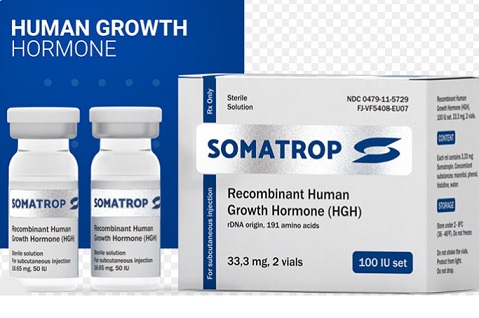Nikhil Prasad Fact checked by:Thailand Medical News Team Jun 22, 2024 10 months, 4 days, 1 hour, 47 minutes ago
COVID-19 News: The COVID-19 pandemic has left a lasting impact on millions of people worldwide, with some individuals experiencing lingering symptoms long after their initial recovery. This condition, known as post-acute sequelae of COVID-19 (PASC) or long COVID, includes a variety of persistent issues, particularly fatigue and "brain fog." Recent research that is covered in this
COVID-19 News report, has explored the potential of growth hormone (GH) treatment to alleviate these neurological symptoms, offering new hope for those affected by long COVID.
 Growth Hormone Treatment Offers Hope for Long COVID Neurological Symptoms
Understanding Long COVID
Growth Hormone Treatment Offers Hope for Long COVID Neurological Symptoms
Understanding Long COVID
Long COVID refers to the condition where individuals continue to experience symptoms weeks or even months after recovering from the acute phase of the COVID-19 infection. Common symptoms include post-exertional malaise, gastrointestinal problems, and neurological symptoms such as fatigue and brain fog. The prevalence of long COVID varies widely, with estimates ranging from 6% to over 50% of symptomatic COVID-19 patients. The exact cause of these persistent symptoms is still not fully understood, but it is believed to be a combination of factors, including lingering viral reservoirs, organ damage, hormonal imbalances, and immune system disruptions.
The Role of Growth Hormone
Growth hormone is essential for various bodily functions, including metabolism, muscle strength, and brain function. It has been observed that COVID-19 can disrupt the secretion of growth hormone, potentially leading to the persistent symptoms seen in long COVID patients. Researchers have hypothesized that growth hormone treatment might help alleviate these symptoms by addressing the hormonal imbalance caused by the virus.
The Study
A team of researchers from the University of Texas Medical Branch-USA conducted a pilot study to investigate the effects of growth hormone treatment on long COVID symptoms. The study involved 13 adults who had been experiencing neurological symptoms of long COVID for more than six months. These participants were selected based on their reduced levels of growth hormone secretion, measured using a glucagon stimulation test.
Methodology
The study was designed to assess the impact of growth hormone treatment over a period of 12 months. Participants received daily injections of growth hormone for nine months, followed by a three-month observation period without the treatment. The researchers monitored various health indicators throughout the study, including cognition, metabolism, body composition, and physical performance. They also collected patient-reported outcomes on fatigue, quality of life, sleep, and mood at different time points: baseline, six months, nine months, and 12 months.
Promising Results
The findings from the study were promising and suggested that growth hormone treatment could significantly improve several aspects of long COVID sy
mptoms:
-Fatigue Reduction: Participants reported a notable decrease in fatigue levels, as evidenced by improved scores on the Brief Fatigue Inventory and the Multidimensional Fatigue Symptom Inventory. This reduction in fatigue was observed consistently throughout the treatment period.
-Mood and Depression: There were significant improvements in mood and reductions in depressive symptoms. These changes were measured using the Beck Depression Inventory-II and the Profile of Mood States. Participants reported feeling less depressed and experiencing better overall mood during the treatment period.
-Quality of Life: The Quality-of-Life Assessment of Growth Hormone Deficiency in Adults indicated that participants experienced an enhanced quality of life. This improvement was reflected in better scores related to socialization, mood, and overall well-being.
-Sleep: Although there were no significant changes in the Pittsburgh Sleep Quality Index, some participants reported improvements in sleep quality and fewer sleep disturbances during the treatment period.
Despite these positive outcomes, the study did not find significant changes in cognition, body composition, resting energy expenditure, or physical performance measures such as the six-minute walk test and leg extension torque.
Long-Term Implications
One critical observation from the study was that the benefits of growth hormone treatment seemed to diminish once the treatment stopped. This suggests that while growth hormone can significantly improve symptoms, it may not address the underlying cause of long COVID. Continuous treatment might be necessary for sustained symptom relief, highlighting the need for further research to understand the long-term effects and potential of growth hormone therapy.
Future Directions
The study's results underscore the importance of exploring hormonal treatments for long COVID. Future research should aim to confirm these findings, explore the optimal duration of treatment, and investigate whether growth hormone therapy can be combined with other treatments for more comprehensive symptom relief. Additionally, researchers should consider studying the effects of growth hormone treatment on different subgroups of long COVID patients, including those with varying degrees of symptom severity and duration.
Conclusion
The pilot study provides a glimmer of hope for those struggling with long COVID. Growth hormone treatment could potentially offer relief from debilitating neurological symptoms, significantly improving patients' quality of life. However, further research with larger participant groups and extended treatment durations is essential to fully understand the benefits and limitations of this therapy.
The study findings were published in the peer reviewed journal: Clinical and Translational Science.
https://ascpt.onlinelibrary.wiley.com/doi/10.1111/cts.13826
For the latest
COVID-19 News, keep on logging to Thailand Medical News.
Read Also:
https://www.thailandmedical.news/news/migraine-medication-olcegepant-shows-promise-in-reducing-covid-19-symptoms-in-older-mice
https://www.thailandmedical.news/news/medicinal-plants-for-the-management-of-post-covid-19-fatigue
